PARBICA Conferences
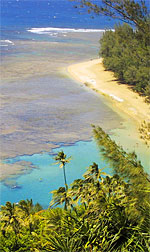
PARBICA 15 REPORT
Honiara, Solomon Islands
August 12-16, 2013
The Pacific Regional Branch International Council on Archives (PARBICA) held its 2013 biennial conference in Honiara, Solomon Islands. The theme for this conference was Leading Archives into the Digital Age, Personal, and Professional Institutions. Over 40 regional delegates across the Pacific and approximately 30 local participants attended the weeklong sessions that included talks, workshops, and meetings. This time around, however, I was the lone attendee from the United States.
The conference opened with two keynote speakers. The first was a short speech by the Permanent Secretary of the Ministry of Culture and Tourism, John Wasi, who acknowledged that archives are important institutions because of their important role of storing and archiving historically information, as well as their importance of records management, transparency and accountability.
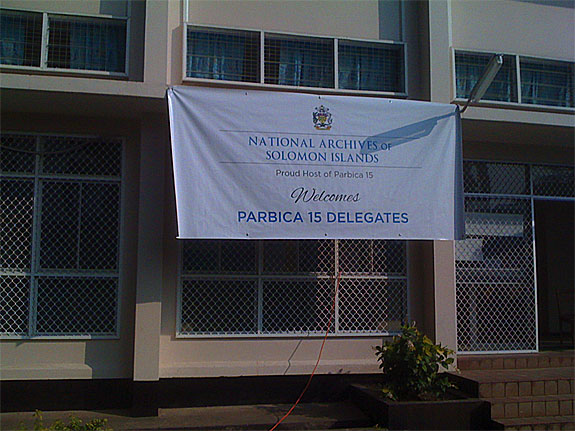
He reiterated that the Solomon Islands government holds a high regard for archives and sees this conference as an opportunity as a means of strengthening the role of their own National Archives. Following Mr. Wasi was distinguished, keynote speaker, Ruth Liloqula to give us some encouraging words on archives. She was the first woman in Solomon Islands to be appointed Secretary to Cabinet in 2007, and has always encouraged all Solomon Islands women to work together to improve their status. Additionally, Ms. Liloqula has held various government posts, including as the Permanent Secretary Ministry of Police, and National Security. She was the first Solomon Islander to hold the posts of Government Plant Pathologist and Director of Research in the Ministry of Agriculture.
On the same morning I was asked to give a very short talk on the Fund for the International Development of Archives (FIDA) award that Island Culture Archival Support (ICAS) and Government Archivist, Julian Chonigolo of the National Archives Solomon Islands (NASI) had received for a project at NASI. It was a one-year project that took place from April 2012 to April 2013, and consisted of mostly preserving the British Solomon Islands Protectorate (BSIP) collection. I, first, talked a little about the BSIP collection and what it consists of, and why it is important. Then, I mentioned the three major goals we had for the project which were to preserve the collection, train staff on how to preserve the collection, and create a preservation manual for paper records. Next, I briefly spoke about the few challenges we had during the project at the archives, as well as for me in the California. Finally, I took a few moments to provide, perhaps, helpful tips on successfully filing out the FIDA application, and ended by encouraging the delegates to take advantage on this very important outside source of funding.
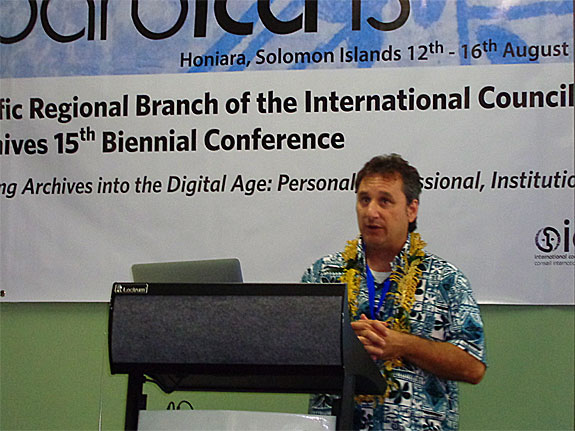
Tuesday morning started off with the country reports delivered by those who work in National Archives throughout the Pacific Islands. This is the part of the conference where I take a keen interest, as I learn what has been accomplished over the past two years since the last time we met. This is also the time where I learn what kinds of issues each archives are dealing with, and what kind of help they need. Needless to say, I took a lot of notes, and learned that many of issues that were present at the last PARBICA conference still persist today. Some of these include financial struggles, not enough staff, and lack of archival training. However, there were a few countries that mentioned some positive outcomes over the last two years, such as FIDA awards given to Palau, Solomon Islands, and Tuvalu, and a new national archives and library building opening on August 23, 2013 in Vanuatu.
On Tuesday afternoon the conference delegates went on a cultural tour to visit the Kakabona village that lies approximately four miles outside of Honiara. The tour offered a glimpse into the every day life of this tropical village. When we arrived, warriors treated us to a traditional Guadalcanal welcome ceremony. As we ventured deeper within the village, we saw women preparing food such as banana, cabbage, and yam that was burnt over a hot stone of charcoal fire. This is the traditional cooking method of the village. Some of the food was soaked in boiled coconut milk before it was cooked. We were also given a demonstration on weaving bowels and mats out of pandanus leaves, and how they make thatched roofing with sago palms. Our visit ended with entertainment by the village boys and girls, as we ate and drank local fruits.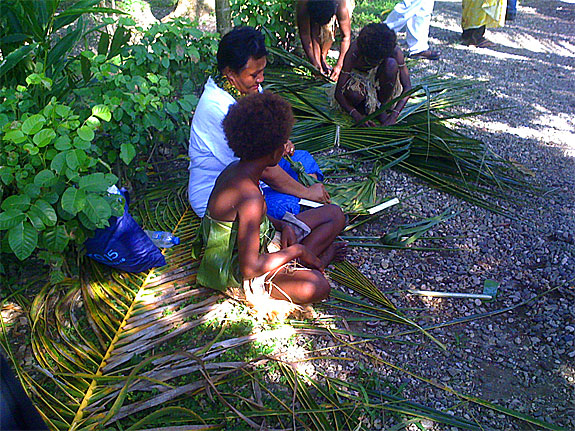
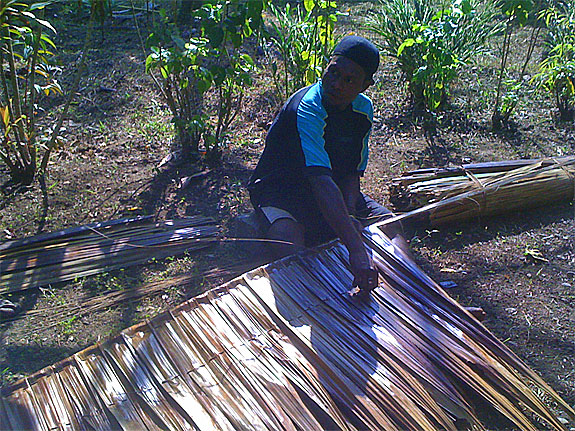
Wednesday and Thursday was workshop day. This meant for those delegates who work in the different ministries of the Solomon Islands that they would be involved in an intensive two-day workshop on records management. The goal of these workshops is to learn how to systematically take care of records before they are sent to the archives. This is important for these delegates, as they do not get this kind of training very often. This is also a good time to establish a relationship with their national archives to ensure that the right records are being saved. The instructors used the Records Management for Good Governance Toolkit that was created by the PARBICA bureau as a guideline.
The first workshop that I participated in had to do with leadership skills. Margaret Crockett who is the International Council on Archives (ICA) Deputy Secretary-General Conferences conducting the workshop that was titled, Implementing an In-Country Training Program. This turned out to be interesting and very appropriate workshop, as many of the delegates are in need of providing training in their respected country.
On Wednesday afternoon the delegates of the conference were given a tour of the National Archives Solomon Islands. This visit turned into an event on the grounds of the National Archives. They had even built a small stage for the afternoon where the opening prayer and welcome remarks were given by some of the staff of the archives. We were then treated to the National Archives theme song performed by a local group, The Ronlus Band. This is the first time I have ever heard a song composed exclusively for an archives. After the tour of the two-story building, we were entertained by a couple of youth cultural groups who performed a variety of dances while we ate delicious snacks.
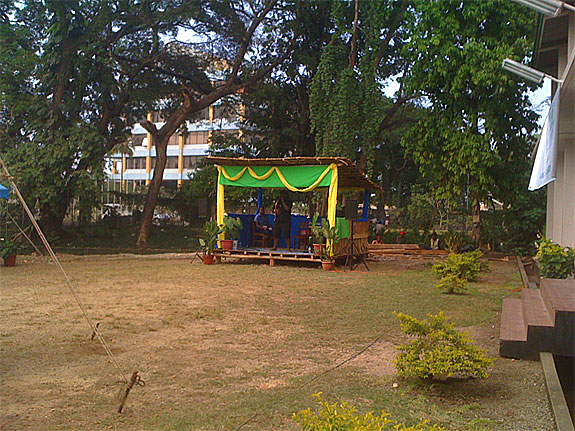
More workshops continued all day on Thursday. The morning session was titled, Developing a Digitization Strategy, and was instructed by Michelle Linton, Managing Director, Linked Training and Kevin Dwyer, Director of Change Factory. The goal of this workshop was to get the delegates to think differently when approaching a digitization plan. The next workshop in the afternoon was an introduction to ICA AtoM that is the open source software for managing archival collections. Maggie Shapley, University Archivist, at the Australian National University, presented the overview. This software is specifically designed for small archives. The delegates were especially keen to learn more about the software, as many of them do not currently have an archival database. Finally, the conference’s special delegate from ICA, Margaret Crockett, hosted the last workshop. She gave us an overview of the history of ICA, and outlined how the organization is structure, as well as its strategic objectives. She then provided different ways that delegates can engage with ICA.
I spent the last day of the conference attending the PARBICA General Assembly on Friday morning. This was opened to all PARBICA members. The 2013-2015 Business Plan was discussed, as well as the organization’s financials for the past two years. We then spent quite a bit of time on how we can improve the goals and objectives of the organization. Then, new officers and members were voted in two serve for the next couple of years. After appropriate congratulations and final words were expressed, we adjourned just in time for lunch.
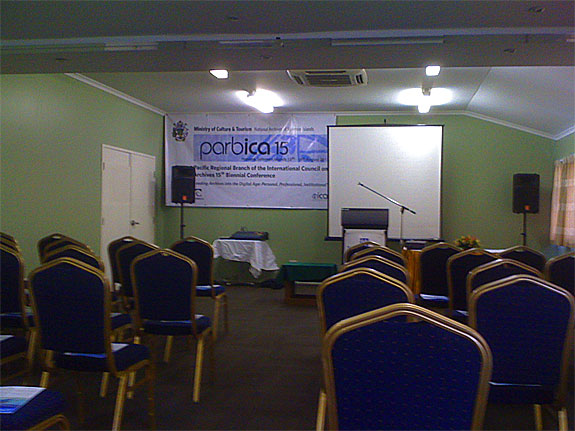
All in all, PARBICA 15 was quite a success for the organization and its host country. The Digital Age issues that pertain to all archives in this part of the world were thoroughly brought forth and heavily discussed. As Mr. Wasi stated, “National Archives are trustees of memory and hence, we must play a leading role in moving into the digital age. We all understand the challenges facing the Pacific region in terms of technology development where some are more advanced than others.” The conference showed how important leadership roles are to the response of the constantly changing and challenging technological environment. Nevertheless, delegates came away with ideas and plans on how to confront these challenges back in their home country. This is, perhaps, my favorite part of the conference- the coming together and collaborating with old relationships, as well as new ones, to produce fruitful outcomes and building a stronger network throughout the Pacific Islands.
